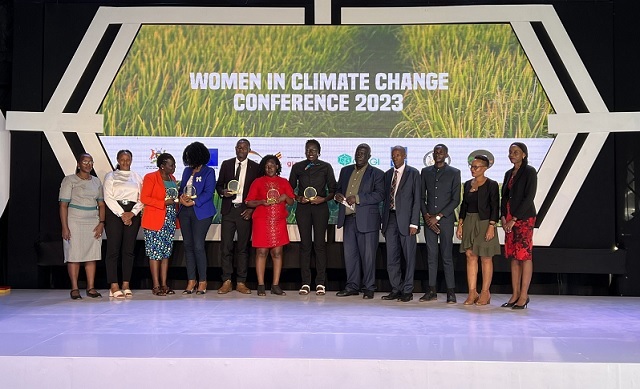
Kampala, Uganda | THE INDEPENDENT | Environmental activists and experts are calling for more inclusion of women in the fight against the effects of climate change.
At the second Annual Women in Climate Change Conference held at the Makerere University Business School on Thursday, activists noted that the isolation of women has hindered the efforts to mitigate the effects of climate change.
Dr Ronald McGill, the Project Lead for the EU-funded Greening of Uganda’s Urbanization and Industrialization project says women lack the freedom and space to actively participate in the climate change issues as they remain trapped in home chores which isn’t the case with their male counterparts.
The world’s population is currently over eight billion while Uganda has over 40 million people, more than half of whom are women. However, in societies such as Uganda, women largely maintain back seats leaving the men to make the majority of the relevant decisions including those special to women.
Gloria Namande, the Program Manager Energy and Climate Change representing UNDP called for transformative solutions and long-term decisions to tackle climate change and put women at the forefront.
She says women should be given a platform to participate in decision-making by taking up influential leadership positions where they can have views on issues affecting women addressed. She says they have done a gender analysis to seek how the roles of women and girls are able to be integrated into climate change and adaptation mitigation actions.
UNDP in partnership with the government developed a National Climate Plan which lays strategies on climate-sensitive planning, project implementation, and funding among others.
@dagmarzwebe “Equity & equality should move together in all agendas though women are made to be inferior at a younger age. #Women deal with #climatechange effects, just educating them is not enough but also be involved in decision making.#womeninclimatechange pic.twitter.com/HAJvUUsI2P
— GGGI Uganda (@GggiUganda) July 6, 2023
Dagmar Zwebe, the Country Representative Global Green Growth Institute -GGGI emphasized that representation shouldn’t be a mere facade but rather a meaningful intervention to have the views and contributions of women integrated into the climate change goals.
Zwebe says women and other marginalized groups should be assisted to make their contributions, emphasizing the concept of equity rather than equality in cases where there are special needs for the different groups.
Margaret Mwebesa Othieno, the Commissioner of Climate Change at the Ministry of Water and Environment says climate change affects women so much because they are responsible for running home affairs such as getting food and fuel for the family.
Commissioner Margaret emphasizes that the National Adaptation plan that @CCD_UG embarked on developing will be all inclusive. There will be a strong focus on marginalized groups being heard as Uganda needs to adapt to the #ClimateChallenges we are already facing today! https://t.co/9c4ZgUAdw9 pic.twitter.com/F2X6SICbvb
— Dagmar (@DagmarZwebe) July 6, 2023
Consequently, women dominate the agriculture sector operating small farmlands where they grow food on a subsistence basis.
According to the Ministry of Agriculture, Animal Industries and Fisheries, women make up more than half of Uganda’s agricultural workforce, and a higher proportion of women than men work in farming. It is estimated that women make up 76 percent of the workforce in agriculture.
Mwebesa says that if women were provided with the necessary resources to improve their agricultural activities and practice smart and eco-friendly activities, they would make a big contribution to the current fight against the impact of climate change.
A recent study by the UN High Commissioner for Human Rights on Gender Responsive Climate Change for the full and effective enjoyment of the rights indicated that if all women smallholders received full access to resources production from their farmlands would rise to 20 to 30 percent, meaning that 100 to 120 people would no longer go hungry and carbon emissions would be reduced by 2.1GT by 2050.
Mwebesa says that by sharing best practices, technology, effective policy measures, and mobilizing sufficient finance any community can decrease or prevent the usage of carbon-intensive consumption methods while producing food for consumption. She says the government has put in place plans and policies which are key in the attainment of the climate goals, but the fight takes more than the government.
Christine Nakimera Kaya, the Woman Member of Parliament for Kiboga district and Shadow Minister for Climate says as concepts of smart agriculture, eco-friendly development, and all are touted, the government should make affordable the alternatives available to the environmentally unfriendly practices.
For instance, she says government should make alternative sources of fuel such as gas and electricity accessible and affordable to Ugandans especially women who take up traditional tasks of cooking meals in their respective homes.
She says a unit of electricity costing 900 shillings is too high if power is to be adopted as a major source of energy especially in domestic spaces.
This year’s Annual Women in Climate Change Conference is organized under the theme “Accelerating Progress on Equality and Empowerment through Innovation”.
*****
URN
 The Independent Uganda: You get the Truth we Pay the Price
The Independent Uganda: You get the Truth we Pay the Price





